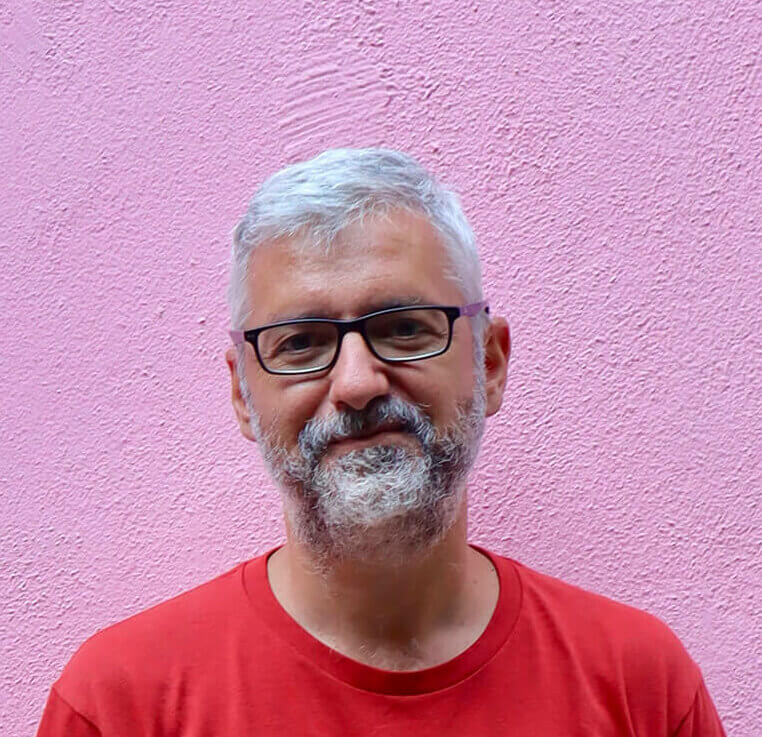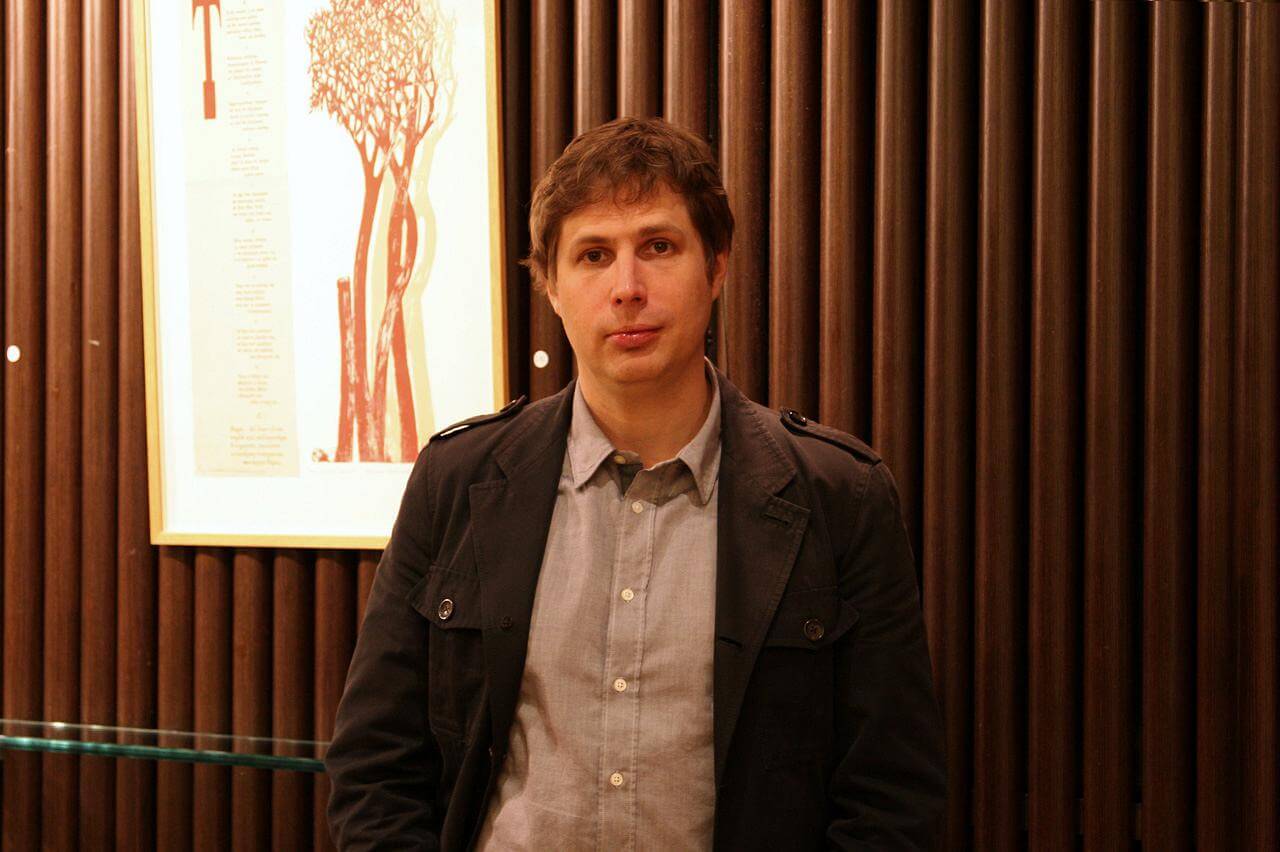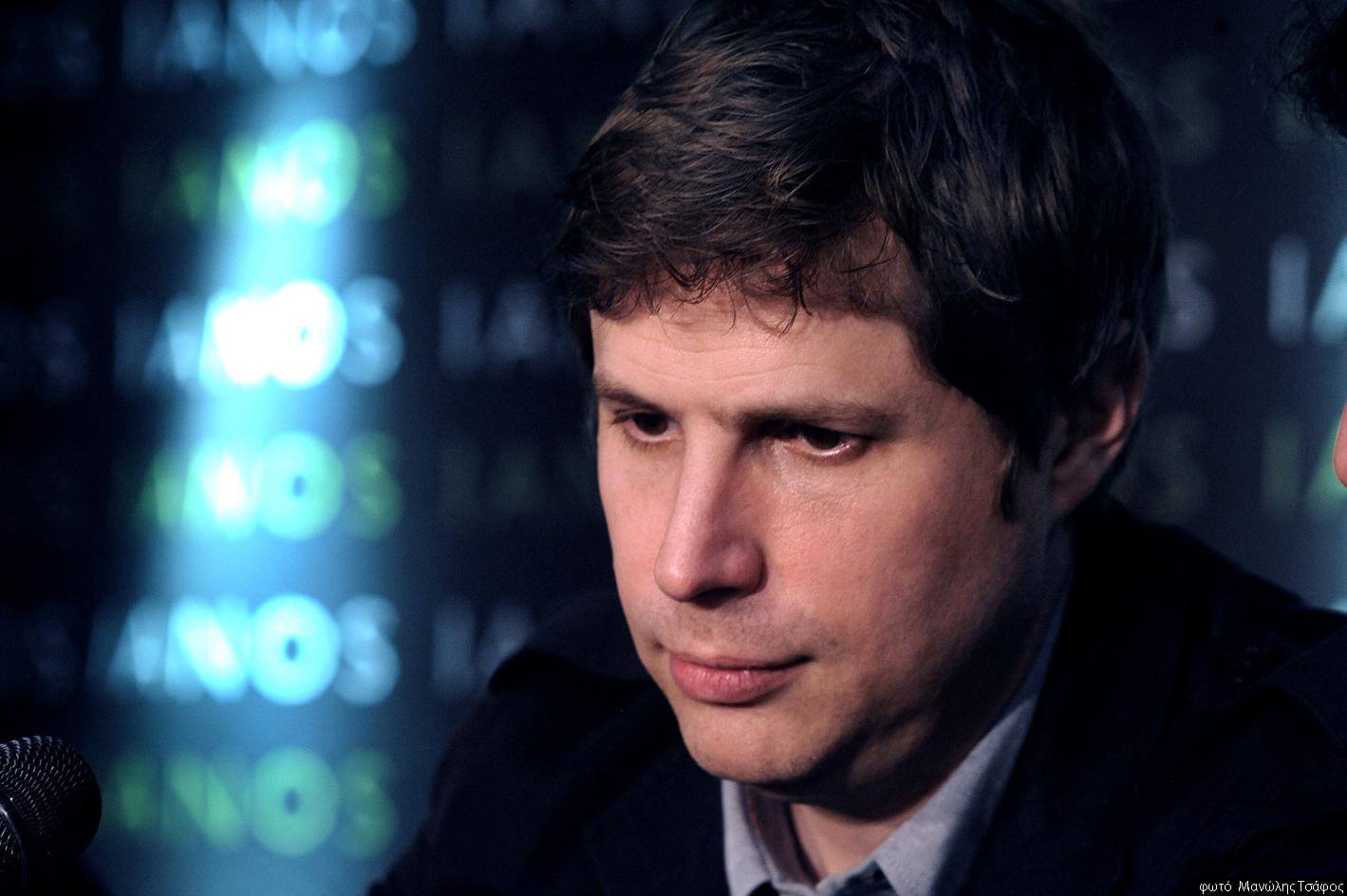Daniel Kehlmann is one of the best known contemporary German authors. His novels have been translated to over 40 languages and have sold millions of copies around the world. He is best known for “Measuring the World“, the fictional reimagining of the lives of mathematician Carl Friedrich Gauss and geographer Alexander von Humbolt, and has written three more novels, two plays and the screenplay of the “Measuring the World” movie. His latest novel, “F“, tells the parallel stories of three brothers, abandoned by their father after a bizarre encounter with a hypnotist.
I met Kehlmann at an Athenian cafe and we talked about lies, literature, the changing role of fiction in a digital culture, and how “The Sopranos” is a work of art as good as the best contemporary novels. (Over there: The conversation in Greek)
Your latest book is about lies. All characters lie. Some get away with it, some do not. How did that idea come about?
I actually started out with the general idea of three brothers. It really developed from the characters. I had this image of three brothers and their father going somewhere bad. And it grew from that.
What? What happened?
It switched off. The voice recording app on my phone. Shut down by itself.
It sometimes does that. A few days ago I had an interview with a Dutch journalist who said that it’s just terrible, this iPhone, the new one. It sometimes just stops.
Stupid piece of crap.
Anyway, as the story of the brothers developed I found out that they were all liars. I started exploring what kind of liars and conmen they were.
They’re not all bad, though.
No, not at all. Martin, the priest who does not believe in God, doesn’t do anything harmful. You could say that he should stop being a priest, but he is actually quite a good person. Ivan, the forger, actually ends up a hero. Eric does do things that are morally hard to justify, but I don’t see him as a bad person either. Talking about truth and lies, I did read a lot about conmen and all kinds of professional lying and betraying during the writing of this book. My view of society used to be that everybody is lying. What I found out was that the reason conmen are so successful and why lying gets you so far, is that most people actually don’t lie. In most situations people are really quite truthful. That’s why we trust others so easily, why we don’t have defences against people who just betray us.
Fiction is a sort of lie. It’s stories that someone made up.
Yep.
What’s your opinion on non-fiction?
I read a lot of it. Maybe it’s a symptom of age. I found out that my friends who are about fifty, they read mostly non-fiction. And I find myself reading more and more. I don’t know if it’s a good or a bad sign. There are wonderful books of non-fiction now, especially in the English language. The Americans have a wonderful tradition in investigative reporting. For example I think Michael Lewis’ work on the financial crisis is better than most fiction writers’. I do read a lot of non-fiction, and of course I do read a lot of non-fiction connected to the topics I write about.
Would you write non-fiction?
I’ve written essays and book reviews, but that’s not quite non-fiction reporting. I might try it one day. So far I still like inventing too much.
Has the role of fiction changed during the past few decades? Readers have access to so many interesting true stories now. Non-fiction is by definition relevant to the reader, because its stories are true. Has that altered the usefulness of fiction?
[motto_right]
The reason conmen are so successful and why lying gets you so far, is that most people actually don’t lie.
[/motto_right]
That characteristic also sort of makes non-fiction easier to write. In fiction you really need to get the energy from the story and the language and the characters, whereas in non-fiction the energy is there by default, because the events are real. The difficult part, of course, is getting things right. To answer your question, of course, the role of fiction has changed. In the 19th century novels were explaining the world to people, telling them how India or Africa look like, how people live. Like with painting and photography and movies that role has shifted not just to non-fiction but also to documentary films, to online journalism and that sort of thing. Literary fiction now is more about the art. I don’t think that’s a bad thing.
It doesn’t sound like a bad thing.
It’s not.
Your books seem to have a strong foundation in philosophical ideas. Why didn’t you go ahead and become a philosopher, instead of becoming a fiction writer?
Well, I didn’t have anything original to offer to philosophy.
You don’t have to, you know.
That’s true. I could have stayed at the university and taught history of philosophy, I think I could have even enjoyed that, but I enjoy writing fiction more. I am still interested in philosophical questions and philosophical ideas, but a novel can’t just be about philosophical ideas, it has to be about people. I don’t believe in novels that are written to put forward philosophical ideas. I will always remain interested in ideas like what is freedom, what is truth, it kind of keeps me from defining myself as a realist.
How would you define yourself? Think about it as a critic would.
Well, “Measuring the World” was pretty much influenced by magical realism. In a way there are always surreal elements in my work. It’s a rather dated term, though. I don’t have a very good answer to that. I don’t think it would be good if I could categorise myself into some corner or some tradition. I think other people would have to do that.
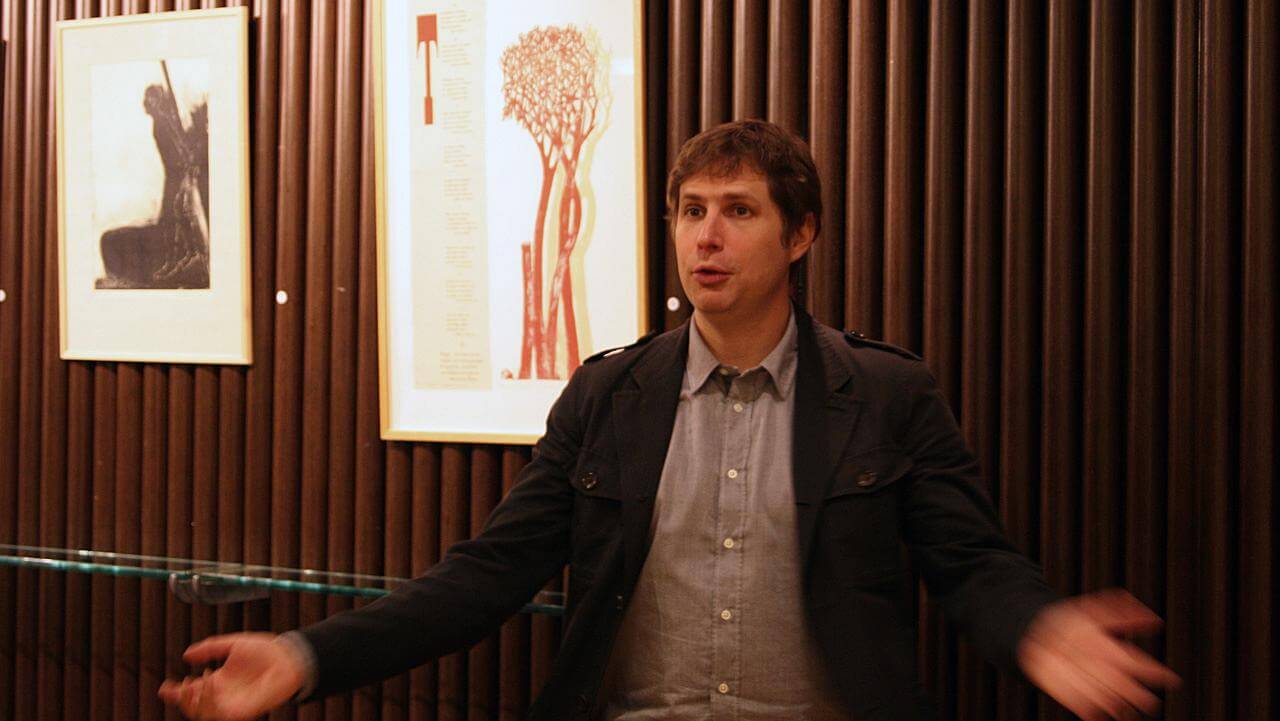
Do you have a routine when you write?
When I started out, I would put limits to myself. Now I just enjoy writing more and more, so I don’t have to set rules or anything like that. That’s not to say that the process itself is always joyful, because sometimes it takes months during which the story does not seem to move forward. Even if I don’t produce anything good, however, the act of writing is always enjoyable. I like to write in the early afternoon and also late at night. I am still writing a lot by hand. Most of “F” was written in longhand, because I find it really helps with the concentration. You can’t check your email on a piece of paper. As everyone else I was always distracted with all the other things you can do with a computer.
I think that by now I am completely incapable of writing by hand.
Many writers I’ve talked to have this problem. Fortunately, in some form or another, I always wrote longhand, so I didn’t lose the ability. You need a good pen and there is a physical joy in it. Even the slower speed helps.
And afterwards you have a tangible object you’ve written on, not an invisible file in a hard drive.
Yes! I use soft-cover large-size Moleskins. It’s nice to have a stack of them, containing the first drafts of my books. Maybe one day a collector will buy them!
Which contemporary novelists do you really admire?
Lots of them. Among the Americans I really admire Jonathan Franzen, Jeffrey Eugenides, Dennis Johnson. Roberto Bolano was a big influence to me, also for “F”. The kind of openness, the courage to not explain everything and to leave things opaque, to leave open questions about the story even the writer doesn’t have the answers to. He gave me a lot of courage on that.
It’s a delicate balance, though. Sometimes those can get infuriating for readers.
Absolutely, in most books he does it well. In some of the posthumously published ones it gets annoying, but that’s not his fault. It’s a difficult balance, of course. Now, who else. Ah yes, just yesterday a friend recommended a French writer named Jérôme Ferrari, a wonderful writer, I’m totally impressed by him -but I read him only yesterday.
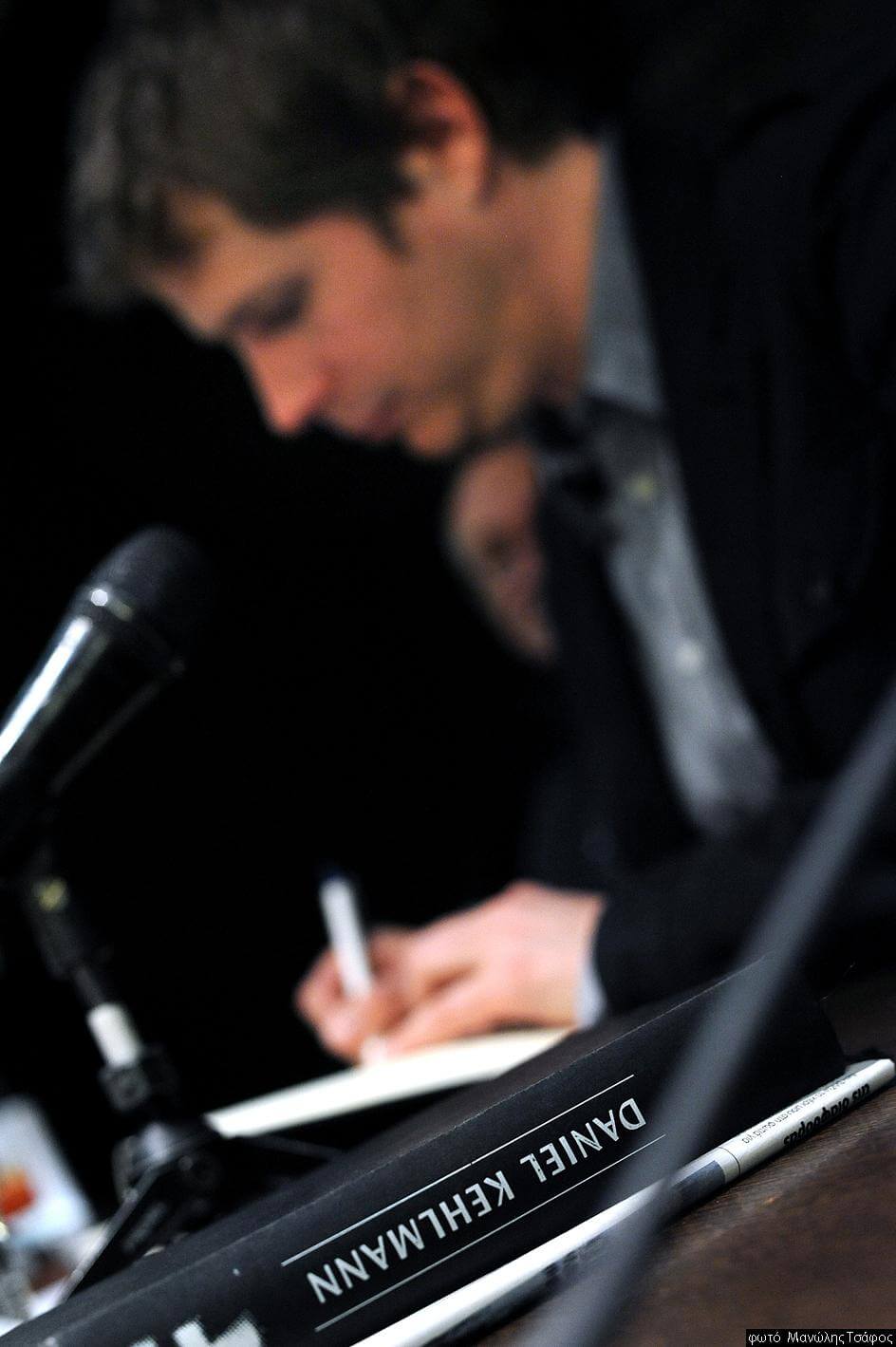
There some very good German writers. There is a wonderful humorous novelist named Sven Regener. He wrote a book called “Herr Lehman“. I just read his latest. He is also a pop singer, a member of the band Element of Crime. I admire him both as a musician and a writer. Another German writer who is absolutely wonderful is Max Goldt, who is also a funny writer. One of the unexpected things about modern German literature is that it’s very funny. I am not saying that Germans are very funny -we still have a problem with humour- but there are many great humorous writers in the country. I also have to say that I am not an expert in German literature. I was always more influenced by North and South American literature -in a way, by writing I wanted to get away from German literary tradition.
That’s understandable. What’s the one book that you are envious of? That you’d love to have written yourself?
Ah, there are so many.
Pick one.
Well, I remember years ago when I read Salinger’s “Nine Stories“. It brought me close to tears for two reasons: One was that it was so extremely beautiful and moving, and the other was that I realised that I would never be able to produce a short story collection so perfect. I just read that four new Salinger books will be published posthumously -I can’t wait, obviously. Another book was Eugenides’ “The Virgin Suicides“. It’s a beautiful, perfect book I’d love to have written. That one also influenced by South American literature, you still hear the voice of Marquez in there.
What is it like to be a famous, very successful writer in Germany? Do people recognise you on the street?
They do recognise me sometimes, but not so often that it makes life difficult. It’s actually quite nice. Germany has a large reading public, so most successful writer, even in the UK and the US, rely heavily on Germany for their income -they may have a bigger audience in Germany than they have in their own countries. It is still a bastion of book readers. It’s very nice to be a successful writer there. When you go to the dentist and give your name, they usually recognise it and are happy to see you and treat you well. On the other hand, they don’t talk to you on the street, partly because Germans are too restrained to do that, and partly also because even if they have read your book they don’t recognise you. You kind of get the good things of fame without the bad things.
Is your generation finally removed enough from the events of the past century to be able to feel detached?
I don’t think so. We shouldn’t be too removed from it -we are the last people who can actually talk to witnesses, people who were there, who saw what happened. That is a big responsibility. We are the last generation able to get first-hand accounts. We should be aware of that and use the time we have and talk to the people who are still accessible to us.
Will you write about the war? Most German artists get around to it, sooner or later.
I think I might write about it eventually. The problem is that there is so much mediocre art produced about this important topic that, if you do write about it, you should do something really good. I’m still thinking about how to approach this, or what to do with it.
What’s your next book about?
I’m not going to tell! I know already, but I’m superstitious, so I can’t say, I’m sorry.
What’s the timeframe? How does the process work from the moment you sit down and say “I have a novel to write now”.
It’s different with each book. With “F” I had to develop the whole thing from the characters so I really took my time. I had to find out what happens to them, where they were going. I kept writing new drafts, kept changing important things -that’s why it took me four years. With “Measuring the World” I knew most of the book in advance so it was much faster, I wrote it basically in one year. I don’t know how long the next one will take. Right now it’s safe to assume that it will take two or three years, but it could be much longer. It won’t be much shorter I’m afraid.
Do you enjoy going on those endless book tours?
Of course. I love travelling. Well, to be more precise, I like being somewhere else. The act of travelling itself, not so much. The whole packing your suitcase, going to the airport, having your plane delayed, those are things I do not enjoy at all. The powerlessness of airports is unbearable. But it is still great to see new places. There should be a better way to get there.
[motto_right]
“Τhe Sopranos” changed how I thought about culture. I started watching in the late 90s, and couldn’t believe that something like this was possible. It was so good. It was as good as the best contemporary novels. A total masterpiece, one of the great works of art for our age.
[/motto_right]
What is your relationship with technology?
I am part of the first generation that really grew up with computers. I had my first computer when I was ten. Using them feels quite natural to me. I tried to write a book about it -“Fame” is about how the world and communications change. But from many respects it already feels from another period, because Facebook isn’t in it. Smartphones too. The change is accelerating. I don’t know where this is going, and am partly worried about it just like everybody else. I don’t even have to mention the NSA surveillance, which is a problem in itself of course. On the other hand I think it changes our lives in very good ways. It’s absolutely amazing, a miracle, that it is possible to continue talking to a friend who moves to Australia on a regular basis, without spending any money. We are annoyed because we are getting too many emails, but it’s still incredible: You can write a letter to someone without even knowing where they are, and it its delivered in one second. It’s wonderful.
Thanks to technology people also read more than ever in the history of mankind. And they also write more.
Yes. Both not on a very high level of quality, however. The problem of reading online, and I am now mostly talking about my experience, is that you never get to finish anything. You lose interest very quickly, you click on things. The biggest threat is the threat to our attention span, our ability to concentrate. Maybe everyone has to work on our ability to focus, every day, like going to the gym.
I have apps for that.
Yes, that’s good!
Technology provides solutions to the problems that technology causes.
Exactly, at least it provides the solutions!
I’d like to go back to the fact that people are now writing more, even in the weird convoluted emoticon-filled language of the internets. Even two decades ago one could conceivably spend his or her entire life after school without writing down anything, ever. Now such a life is practically impossible. People develop a relationship with the written word that may not be perfect, but at least it’s there. I believe that is a blessing for writers, or anyone who lives by producing words.
Yes. But only if people don’t lose the concentration span necessary to read what writers produce. I am wondering about myself. I read differently on a screen or on paper. I have a New York Times subscription on the iPad. It’s wonderful, I can read the Times wherever I am. But I hardly finish an article. But you’re right, the written word is now a part of a lot of people’s lives.
Have you tried simple e-book readers? I read “F” on a Kindle.
I did. I have one. It’s wonderful for travelling . As a writer I am concerned about illegal downloads, but as a reader and somebody who travels a lot, I really like to use it. And e-book readers are much better for the attention span -because you can only read books on them. That’s also something I’ve realised: If the device you use for reading can also show you movies, you’ll always end up watching a movie. It is easier.
You know, as a writer you do request a lot of time from readers’ lives. There’s a lot of competition for eyeballs going on.
Yes. I actually believe that the biggest competition for serious literary writing right now is good television. There are so many really good TV shows out there that are as good as great novels.
Do you binge-watch television shows?
I do that. It’s a lot like reading. Watching a 10-episode TV show takes as much time as reading a novel. And you don’t have to feel bad about it afterwards, because many of these TV shows are as good as good novels. That’s the biggest competition for writers now. I know young people in their twenties who are well educated, intelligent, open, interested, but they don’t read novels. They watch TV shows instead. I can sort of understand it. Maybe it’s a good thing, too. Competition is a good thing. You just have to be aware that it’s there.
Tell me some of the shows that you like.
I think “Τhe Sopranos” changed how I thought about culture. I started watching it in the late 90s, and I couldn’t believe that something like this was possible. It was so good. It was as good as the best contemporary novels. A total masterpiece, one of the great works of art for our age. And it got better and better, and the ending was perfect. Same thing about “Six Feet Under”, and also “The Wire”, though I was always more of a Sopranos person rather than a Wire person. I just watched Jane Campion’s Top of the Lake which is extremely good. Yesterday on the plane, after reading a little Jérôme Ferrari as I mentioned, I switched to video on the iPad and started watching a French show called “The Returned”. It’s about a small village where the dead come back. Not like zombies, they come back like regular people and no one knows why. Very slow, beautiful, strange and unsettling. It’s a real work of subtle, beautiful art. I think people who don’t watch television miss a lot.
Would you like to write for television? I think “Fame” would make a great show.
They turned it into a movie in Germany. It was a total flop. It kind of makes you realise how brutal the world of film is. It cost 5 million euros to make, and after the first weekend in theaters, it was gone. I did write two plays for the theatre and the screenplay for “Measuring the World”, though. After that I went back to writing my novel, and it really felt like coming home. I might try other forms of storytelling, but the thing I like the most, and the one I think I do best, will always be fiction.
More talks:
Luca Turin
David Shing
